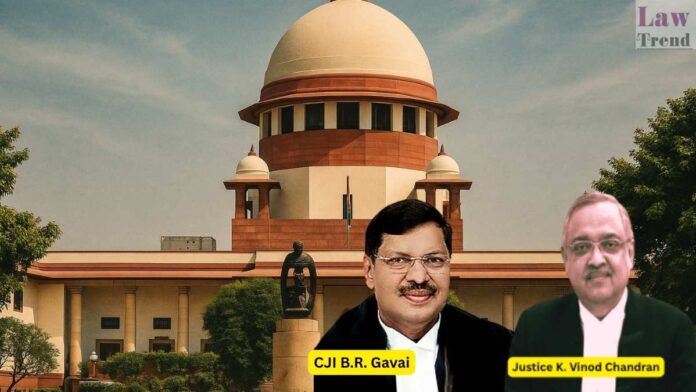The Supreme Court on Monday sharply questioned the Union government over the Tribunals Reforms (Rationalisation and Conditions of Service) Act, 2021, asking how Parliament could re-enact a law whose key provisions had already been struck down by the Court, with only “minor changes”.
A bench of Chief Justice B.R. Gavai and Justice K. Vinod Chandran was hearing a batch of petitions, including one filed by the Madras Bar Association, challenging the constitutional validity of the 2021 law. The Act abolished several appellate tribunals, such as the Film Certification Appellate Tribunal, and revised appointment and tenure norms for members of various tribunals.
Bench Questions Legislative Re-Enactment
Chief Justice Gavai observed that the issue before the Court was not Parliament’s power to legislate, but the fact that the same law—already declared unconstitutional—had been brought back with “some minor changes here and there”.
“The issue is how Parliament can enact the same law (which was set aside) with some minor changes. You cannot enact the same law,” the CJI remarked, adding that the legislature must address the basis of the earlier judgment before re-enacting provisions that were struck down.
Attorney General R. Venkataramani, appearing for the Centre, responded that Parliament is not barred from legislating merely because a previous version of the law was invalidated. “Parliament has applied its mind to issues of accountability, trust and efficiency,” he said, insisting that the 2021 Act emerged from “detailed deliberations” rather than “a figment of imagination”.
AG Defends Law as ‘Balanced Framework’
The Attorney General defended the statute as a measured attempt to balance judicial independence with administrative efficiency, stating that executive participation in appointments was limited and subject to judicial predominance.
“There is executive participation in appointments, but the veto lies with the Chief Justice,” he said, adding that both the selection and reappointment processes maintained a judicial majority.
Addressing concerns over the five-year tenure, Venkataramani argued that it met the objections raised by the Supreme Court in Roger Mathew (2019), which had found shorter terms detrimental to judicial independence.
“If five years is recognised as a reasonable period and comes with a provision for one reappointment, that would be a good practice to follow,” he submitted. He further emphasised that reappointment would depend on performance, not executive discretion, and that the new framework avoids indefinite extensions while encouraging experienced advocates to serve on tribunals.
Petitioners Allege Violation of Judicial Independence
The petitions, led by the Madras Bar Association, contend that the Tribunals Reforms Act, 2021, undermines judicial independence and violates the doctrine of separation of powers by granting excessive control to the executive in appointments and service conditions of tribunal members.
The Attorney General, however, argued that “minimal independence” and a structured role for the executive do not violate the constitutional scheme. “If minimal independence is assured and the executive is observed in a way that is larger than one would visualise, then it is not in non-conformity with judicial independence,” he said, urging the Court not to replace Parliament’s considered framework with “indeterminate criteria”.
Background: Court Had Earlier Struck Down Similar Provisions
The Supreme Court had earlier invalidated several provisions of the Tribunals Reforms Ordinance, 2021, which were later replicated in the August 2021 Act.
In that verdict, the Court struck down:
- The four-year tenure for tribunal members and chairpersons, extending it to five years to ensure security of tenure;
- The minimum age of 50 years for appointments, holding that it restricted younger entrants and undermined judicial vitality;
- The executive’s power to select from a panel of two names recommended by the selection committee, insisting instead on appointments from the full list.
The Court had also emphasised that judicial members must have at least ten years of legal practice, akin to High Court judges, and that the maximum age should be 70 for chairpersons and 67 for members.
Centre’s Bid to Refer to Larger Bench
Before the day’s arguments began, the bench expressed displeasure at the government’s late request to refer the matter to a five-judge bench, saying it was inappropriate to raise such a plea “at the fag end of final hearing”.
The hearing in the batch of petitions challenging the Tribunals Reforms (Rationalisation and Conditions of Service) Act, 2021 will continue.




